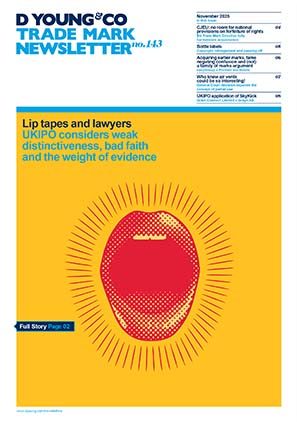Net zero: green trade mark trends and tips
Published in February 2024, the UK Intellectual Property Office’s report “The race to net zero: tracking the green industrial revolution through IP” divulges trends in green trade marks between 2000 and 2021.
The report was commissioned to provide an insight into the progress towards the UK Government’s legally binding target for the UK to be net zero by 2050. It is widely accepted that an increase in innovation and investment in green technologies will be essential to deliver the net-zero target.
While the purpose of trade marks is to indicate origin rather than to indicate innovation, a trade mark can nevertheless be used in relation to an innovative product and/or service. There is no legal definition for green trade marks. Within the context of the UKIPO’s report a trade mark application was considered to be green if the goods/services specification contained at least one “green term”. The list of green terms was taken from the European Intellectual Property Office’s “Harmonised Green Terms” inventory. To analyse the distribution of green trade marks, they were then divided up into different product categories and groups, such as pollution control, reusable and waste management”.
Trends in green trade marks
Some of the key findings from the UKIPO report regarding trade mark applications filed between 2000 and 2021 are that:
- More than one million trade mark applications were filed, and around 6% of these were considered to be green trade marks.
- The proportion of overall trade mark applications containing at least one green term has generally increased in recent years (and particularly after 2015).
- The energy conservation product group accounted for around 26% of all green trade marks. Energy conservation covers, for example, the storage of electricity (such as batteries). The pollution control product group accounted for 17.4% of all green trade marks and covers, for example, air and water purification. Agriculture was the least popular product group with just 0.9% of green trade mark filings.
- The most popular product groups in which green trade marks have been filed has changed over time. The transportation product group has recently increased in popularity, with more trade mark applications being filed in this product group relative to others. In contrast, the climate change and waste management groups have decreased in popularity relative to other product groups.
- Green trade mark applicants in the UK are mainly from the UK, China, the USA and Germany.
- On the patent side, the largest green technology sectors in the UK were found to be green vehicles and green buildings. This aligns with the finding on the trade mark side that storage of electricity is a key category overall in all the top countries.
- The highest number of green terms can be found in classes 9 (electrical and scientific apparatus), 11 (environmental control apparatus), 40 (material treatment) and 42 (computer scientific).
So what does this tell us?
As with any data analysis there will be assumptions and limitations and these are recognised in the report. For example, on the one hand, the volume of green trade marks could have been overestimated because a specification can include both green and non-green terms, and the mark filed may have been focused on the non-green terms. On the other hand, many of the green terms identify products and/or services that are intrinsically green, and would not identify a product that has been produced in a sustainable way. It would also be difficult to account for the following from the UKIPO’s objective dataset:
- Applicants might not be using their green trade marks yet.
- Applicants might be using green trade marks without filing applications.
- Applicants might be claiming to be green when they are not.
There is nevertheless a general inference from the UKIPO net-zero report that green innovation is increasing, at least in some areas.
Practical tips for green trade marks
- The UK and EUIPO will review a specification containing green terms in the usual way: if the specification is not clear and precise then an objection will be raised.
- If a trade mark owner later decides not to use a registration in relation to the green terms, then the registration may become vulnerable to a non-use cancellation action after five years of registration.
- The term “greenwashing” is used to identify businesses that are using green branding deceptively to persuade the public that their goods and/or services are environmentally-friendly. In the UK there is a requirement for an intention to use. In both the UK and EU, if an applicant applies for green terms in their specification but has no intention to use them, then this could in theory be attacked on the grounds of bad faith.
- If businesses are using existing trade marks for new green innovations, it is recommended that new trade marks are filed to cover the new goods and/or services and that existing agreements (such as licence agreements) are reviewed to ensure that new goods and/or services are included where appropriate.

